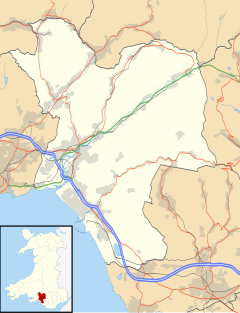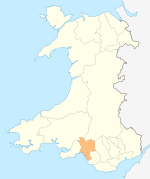Human settlement in Wales
| Cilybebyll | |
|---|---|
 The Church of St John the Evangelist, Cilybebyll The Church of St John the Evangelist, Cilybebyll | |
 | |
| Population | 4,769 (2011) |
| OS grid reference | SN7404 |
| Community |
|
| Principal area | |
| Preserved county | |
| Country | Wales |
| Sovereign state | United Kingdom |
| Post town | SWANSEA |
| Postcode district | SA8 |
| Dialling code | 01792 |
| Police | South Wales |
| Fire | Mid and West Wales |
| Ambulance | Welsh |
| UK Parliament | |
| Senedd Cymru – Welsh Parliament | |
| |
Cilybebyll /ˌkɪləˈbɛbɪl/ is both a village and a community in the Neath Port Talbot County Borough, Wales. It includes the villages of Alltwen, Fforest Gôch, Gellinudd and Rhos. The village is located 2 miles (3.2 km) east of Pontardawe, 5 miles (8.0 km) north of Neath and 10 miles (16 km) northeast of Swansea. The community has a population of 4,769 in 2011 census.
Cilybebyll estate
The Cilybebyll estate was established in the 15th century, and after development by various families, by 1838 was recorded as having the largest land holding in the district. Plas Cilybebyll, the main house, was redeveloped in 1840 by Henry Leach, creating a south-facing Victorian facade on the property. His son Frances Edward Leach inherited the estate in 1848, changing his name to Lloyd in 1849 by Royal Charter in order not to forfeit his inheritance. The family remained in residence until the early 20th century when the family records were passed to the Swansea Museum. Plas Cilybebyll is now a guest house.
Coal mining disasters
Like much of South Wales, small-scale coal mining has taken place in the area for many centuries. By 1849 it was producing large quantities of coal, which were readily transported around the world from the docks at Swansea. The dangers of coal mining past and present are highlighted by two disasters in the locality. In 1858, 14 men and boys died as a result of engine fumes being accidentally pumped into the Primrose Colliery. In 2008 the community council commemorated the 150th anniversary with a plaque on a park bench.
On 15 September 2011, water poured into the mine workings at Gleision Colliery, a small scale colliery which had expanded as the price of anthracite had risen. Three miners escaped to the surface, with one taken to Morriston Hospital. Units from the Mines Rescue Service were called in from across the country, to rescue four men located 300 feet (91 m) below the surface. Four bodies were subsequently found. Parallel inquiries into the causes of the disaster were launched by South Wales Police and the Health and Safety Executive.
References
- "Community population 2011". Archived from the original on 4 March 2016. Retrieved 12 April 2015.
- "Cyngor Cymuned Cilybebyll Community Council". Archived from the original on 29 August 2017. Retrieved 29 August 2017.
- "Custom report - Nomis - Official Labour Market Statistics". www.nomisweb.co.uk.
- "West Glamorgan Archive Service: Cilybebyll Estate Papers". Your Gateway to History. Archifau Cymru. Archived from the original on 25 March 2012. Retrieved 15 September 2011.
- Gleision Colliery near Cilybebyll: Brief history. BBC News Wales, 15 Sept 2011
- Samuel Lewis (1849). "Killymaenllwyd - Knighton". A Topographical Dictionary of Wales. Institute of Historical Research. Retrieved 20 May 2013.
- www.cilybebyll.net documents Accessed 20 May 2013
- "Four Miners Trapped in Swansea Valley Mine, Three Freed". BBC News Wales. 15 September 2011. Retrieved 15 September 2011.
- Morris, Steven (16 September 2011). "Fourth Miner Found Dead in Wales". The Guardian. Retrieved 16 September 2011.
External links
- A Vision of Britain Through Time
- British History Online
- British Listed Buildings
- Genuki
- Geograph
- Liber Mortuorum: The Book of the Dead: St John the Evangelist, Cilybebyll
- Office for National Statistics Archived 14 September 2012 at the Wayback Machine
